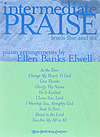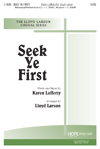- |
User Links
Seek Ye First
Hymn Information
- First Line
- Seek ye first the kingdom of God
- Paraphraser
- Karen Lafferty (1972)
- Tune Name
- LAFFERTY
- Composer
- Karen Lafferty (1972)
- Topic
- Kingdom · Hymns about Prayer · Elements of Worship: Offering Our Prayers
Copyright Information
- Text Copyright
- © 1972 Maranatha! Music, admin. Capitol CMG Publishing
- Tune Copyright
- © 1972 Maranatha! Music, admin. Capitol CMG Publishing
- Reprint/Projection Information
- Words and Music: Permitted with a license from CCLI.com. If you do not own this license, please contact the copyright holder for permission.
Scripture References
Thematically related:
- st. 1 =
- st. 2 =
- st. 3 =
Further Reflections on Scripture References
Karen Lafferty (b. Alamogordo, NM, 1948) wrote this song one night after attending a Bible study on Matthew 6:33 in 1971 at Calvary Chapel, Costa Mesa, California. Struggling with financial difficulties after recently starting a full-time music ministry, she returned home that night with new encouragement. Others appreciated its beauty and simplicity, and the song soon gained popularity, eventually providing the support that permitted her to continue and develop her ministry. Other stanzas, also based on well-known quotations of Jesus, were written anonymously. Stanza 2 is based on Matthew 7:7, and stanza 3 on Matthew 4:4 (quoting Deut. 8:3). The first two quotations are from the Sermon on the Mount, and the third is Jesus' response to his first temptation in the desert. The addition of anonymous stanzas is a phenomenon related to the oral tradition in which many Scripture songs have developed. The three stanzas together persistently and fervently direct our attention to the things of God in the context of living praise ("alleluia"), indicating that such a manner of life is necessary before God. Maranatha! Music published the composite and recorded it on their initial Praise album (1972).
Bert Polman, Psalter Hymnal Handbook
Confessions and Statements of Faith References
Further Reflections on Confessions and Statements of Faith References
Belgic Confession, Article 26 provides the foundation for all our praying: “We believe that we have no access to God except through the one and only Mediator and Intercessor ‘Jesus Christ the righteous,’ who therefore was made human, uniting together the divine and human natures, so that we human beings might have access to the divine Majesty. Otherwise we would have no access.” We offer our prayers, therefore, “only on the basis of the excellence and dignity of Jesus Christ, whose righteousness is ours by faith.” Heidelberg Catechism, Lord’s Day 46, Question and Answer 120 verifies this privilege when it says, “Through Christ God has become our Father, and…just as our parents do not refuse us the things of this life, even less will God our Father refuse to give us what we ask in faith.”
Seek Ye First
Additional Prayers
Seek Ye First
Tune Information
- Name
- LAFFERTY
- Key
- D Major
- Meter
- irregular
Recordings
Musical Suggestion
- Congregation on melody, instrument on descant, beginning with stanza 2. (An oboe would carry over a large congregation; violin, flute, or recorder would also work well.)
- Congregation on melody, with as many members as wish singing on the descant, probably also waiting until stanza 2.
- The entire congregation singing as a round, with group 1 beginning with the melody and continuing with the descant; group 2 comes in on the melody when group 1 is ready for the descant. In this way, the melody and descant continually trade parts.


 My Starred Hymns
My Starred Hymns







